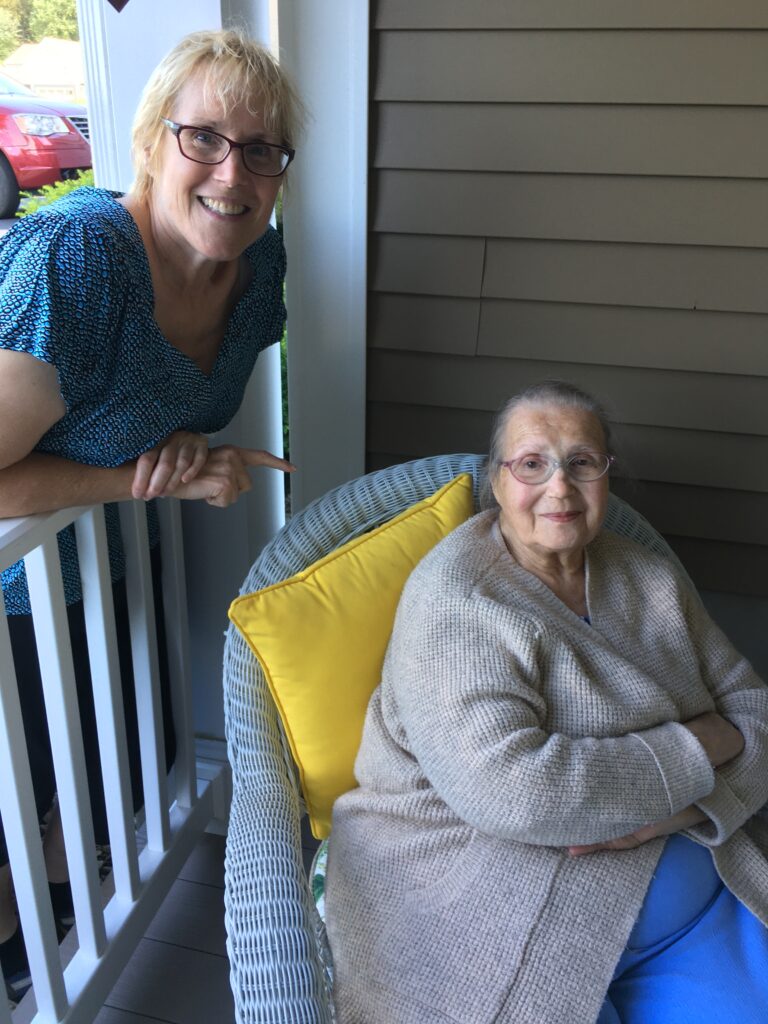“It put my mind at ease.”

Florence and her daughter Joy are both very familiar with medical care. With 86-year-old Florence having retired from the nursing profession and Joy still practicing as a nurse, it was clear that something serious was happening for them to make a late-night trip to the emergency room at Penn State Health Milton S. Hershey Medical Center.
That evening, Joy was concerned about her mom’s labored breathing and high fevers. “She rarely goes into the hospital,” Joy shares. Following a stroke in 2018, Florence developed difficulty swallowing and sometimes aspirates food into her lungs, which puts her at risk for developing pneumonia. Both Florence and Joy assumed a stay in the hospital was inevitable following her ER visit. “It’s why she didn’t want to go to the hospital,” Joy says.
Early the following morning, after testing confirmed she would need antibiotics for pneumonia and continued oxygen to support her breathing, the doctor came in and confirmed their suspicions. “They said to her, ‘you know you’re going to have to be admitted because you need oxygen,'” Joy remembers. “She just lowered her head and shook her head yes,” she added.
From planning a hospital stay to excitement about returning home
To both of their surprise, Florence was then offered an alternative to an inpatient stay in a hospital bed. A team member from the Penn State Health Home Recovery Care program gave her the option of returning home to receive hospital-level care. “When they asked, ‘would you rather go home?’ Her face lit up and she shook her head yes again,” Joy says.
She explained that previous hospital stays had been stressful for both of them, with Joy worrying about her mom’s care away from the home they share together, and Florence experiencing complications like a serious hospital-acquired clostridium difficile infection, common in her age group.
The idea of going home for care “put my mind at ease,” Joy says. “She would have been in the hospital, on fall risk precautions, and told not to get up without ringing the call bell.”
In contrast, at home, “It’s a familiar environment, and she was up walking more. In the hospital, she would have been more sedentary, it would have taken longer to build her lung capacity up, and more than likely she would have ended up in rehab to regain her strength.”
Hospital-level care at home
Once Florence opted into the Home Recovery Care program, Joy says she was on her way home by 12:30 that afternoon. “It was that quick!” she exclaimed. “They gave us all the supplies— the oxygen, tablet, blood pressure cuff, pulse ox, digital scale and everything that someone would need to care for themselves at home.”
Florence also received twice daily nursing visits, and regular lab draws and virtual check-ins with a Penn State Health doctor. “The other thing we found completely impressive is the piece of equipment that the nurse would use to collect all the data for the doctor,” Joy added. “They would send it to the doctor, and they could listen to her heart, lung and bowel sounds.”
She was also thrilled with the nursing care. “The nursing care was absolutely fabulous,” she says. “They were so kind and so caring, and thorough. I wish all nurses were like that.”
A positive outcome with hospital care at home
Happily, Florence’s breathing improved quickly, and she transitioned to home health care to continue to regain her strength. When asked what the best part of Home Recovery Care was for her, Florence’s answer was simple: “That I was home.” Joy added to that: “Especially for an 86-year-old!” She credits her mom’s stay in the program with avoiding a lengthy stay in a skilled nursing facility and getting her back to her regular neighborhood walks more quickly.
If she had the option to receive her care at home again, Florence enthusiastically says, “Oh yes, this is the way I would go!” Both she and Joy have been spreading the word to neighbors, friends and colleagues that Milton S. Hershey Medical Center offers this program for eligible patients. As Joy states, “A large number of people don’t need to be in the hospital.”
